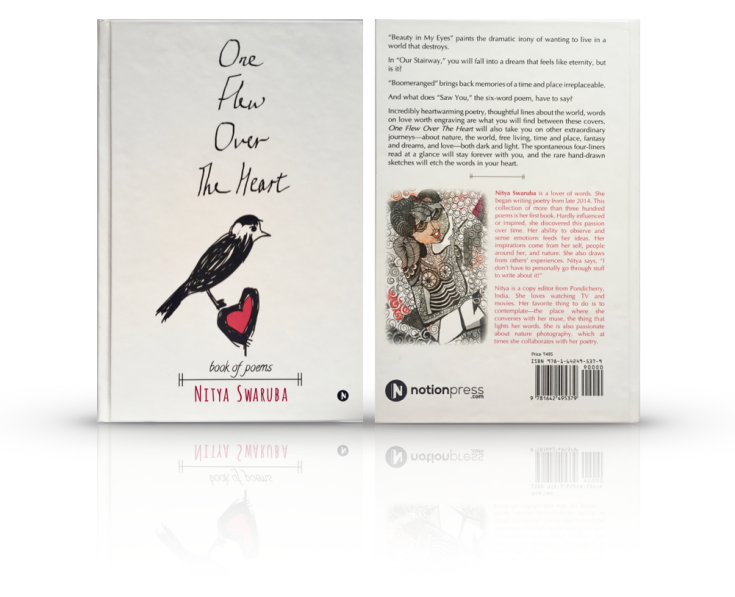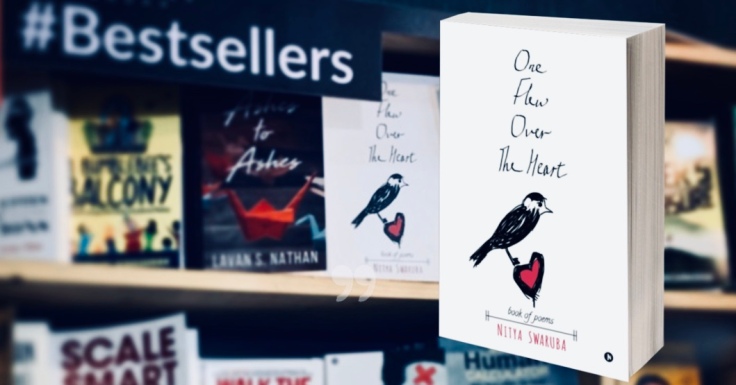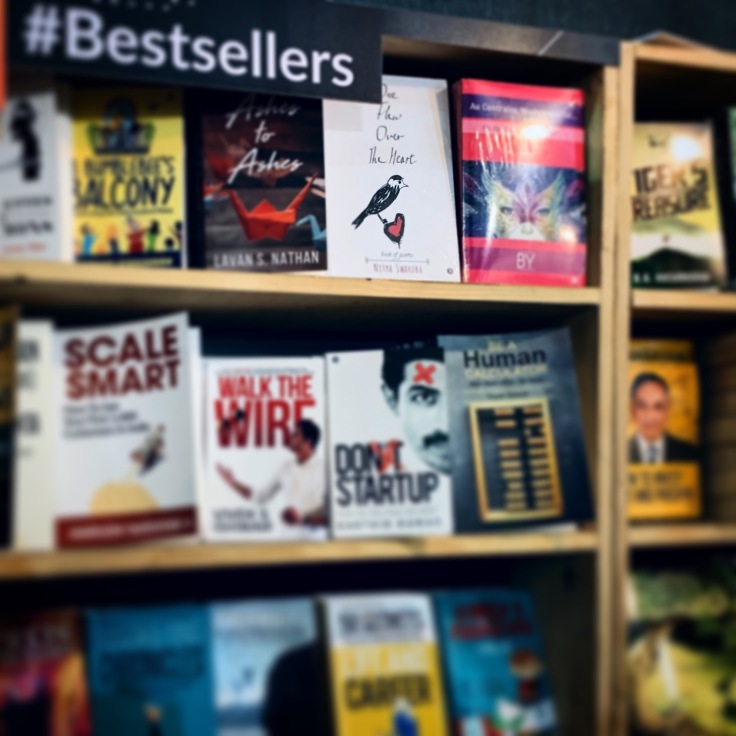Foreword by Kanchan Dhar
Words from Under the Burning Bridge is Nitya Swaruba’s second book of poems and is all about women and love for them. I think I have been really tired reading the Instagram poets, the likes of Kaur, Waheed, and Gill, that a lot write about sexism, the man problems in relationships, feminism, the fierceness in women, fighting against the odds and evens. Few really take the time today to admire a woman in sheer terms of beauty, rejecting for once direct assertive feminist terms, and that is exactly what Nitya’s little collection here does. They remind me of the beautiful
shayaris (meaning poetry in Urdu language) of Shakeel Badayuni, an Indian Urdu poet and songwriter in Bollywood, I used to read when in college. I always found them romantic and hauntingly mesmerizing. Poems in this book appear like
shayaris to me, but in English. They make me wonder, make me ponder, on this creation called woman.
The book has seven neat sections, each expressing a distinct idea, but if one follows the poet’s thought process that went into composing these pieces, you may find each uniquely titled section is like a little chapter in the narration of a personal love affair.
“glimpse” begins with a poem titled “woman.” I quote a few lines here:
she carries herself with invincible grace
she is beauty plus the brains
she animates the world around her
her presence makes a difference, purifies my mind
Human beings come in many varieties, men and women both. My idea is, perhaps the picture of the woman that Nitya paints through her words is not for women in general. It is too idealistic. I have a feeling these words of love, affection, and appreciation are directed towards a someone in particular, perhaps a dear acquaintance, or a platonic love? Through this ideal love, she sees her woman’s world. Not that I am not aware of the grim realities nor she, but taking time to admire the goodness, the beauty in all of it, is also worth the poetry. It is like acknowledging the existential miracle of the lotus that blooms in muddy waters.
As the pages in the book roll, you realize each poem, like “angel of life,” is a character sketch, perhaps celebrating some womanly soul the poet has known or heard of. The poem titles also communicate a lot regarding the tone of the poems, how the poet views and values the women in her life, and how personalized her writings are, such as the third poem in the section. “you” paints a very care-free, happy, colourful image and sends out the message that beauty is in attitude, beauty is in laughter, beauty is in colours. “fireworks” is a poem of romance and love, could be for a lover, a baby, a best friend, or simply her mother! Beautiful, innocent love. It is about acknowledging the chemistry, the fireworks, when you love a woman.
“manifest” is all about valuing the women (rather woman) in her life. In “flip”, she states how she proved to be a muse to her, inspiring her poetry, literally awakening her.
just a prisoner was I of flesh and bone
an ocean of words slept inside
you walked past, flicked a stone
I’m rippling still as seasons go by
A deep bond is established between the poet and her muse, possibly also her object of love. In “two paintings,”
heaven stopped being imaginary takes you back to her first book,
One Flew Over The Heart. The line clearly expresses the impact this she or you has had on the poet’s mind, voice, and existence.
I sincerely believe Nitya Swaruba is a recluse poet. Yet mesmerizing. Her poems take me back to the environ of nineteenth-century romantic poets. All her woman poems are love poems indeed. But her love is a kind the ordinary usually wouldn’t pursue. There is an obvious distance. Like “two paintings,” she knows her and her interest are not in the same frame. But I guess the peace is made. The existence matters, and that is enough. Love matters. No other presence, no external opinion, or social politics hardly ever makes a difference. The poet loves silently, unhesitatingly, with all her heart. Her attempts are never to grasp this love, or own it, or merge into it. I guess, if ever that happens her poetry may cease. So long as she keeps her safe distance, Nitya’s poems of love continue. Her acknowledgement of her emotions is honest and sincere. It is really up to her to accept the poet’s words of love. Either way the poet’s feelings will remain unchanged.
The last two poems in the section, “completeness” and “always,” are her final responses to this relationship and what it means to her—the beginning and the end of her world at the same time. “always” firmly asserts the emotional aspect of the relationship.
“ignite” makes a shift from pain to consolation to gratitude. The feels are—what pushed her to words, what roused her wakefulness, what inspired her to poetry (she being the motivation always), the gratefulness for it, and last, the happiness for it. She writes in “two flowers”:
the bit of you for me you left behind
In the poem “you are it,” the poet permanently internalizes her as her eternity, her forever source of inspiration, her aspiration.
“withdraw” emphasizes the distance, the space between the poet and her love. I quote a few lines:
from “cosmic love”
close enough for me to write and you to read
from “disconnected”
just space between us a little more than enough
But nothing dampens the love. Somewhere I also feel this love is happily unrequited. There is not a single expectation of love from the other end, nor is there even a whisper of it coming from her. It’s one-way, that’s definite. Is the poet satisfied with it? Well, there are no complaints, except maybe a brief admitting of the aloofness, such as in the poem “whisper”:
but it’s just me
I whisper myself to sleep
On first reading the poem “phantom ring,” I thought, how does this fit in the book? A second reading cleared my doubt. The poet is so lost in thoughts, that she imagines a ding of her phone, she expects, could it be a ring from her? This “ring” builds the pathos in the book.
“dissolve” is a lot about admitting that beauty is vulnerable, could be even compromised; this beauty is not of skin, it originates from the heart; the poet wants to save it, protect it, for beauty’s sake or for her own, we don’t know. In “pity flower,” reality surfaces; it is the talk of the world where women don’t belong. She writes,
…a flower
swaying to
the directions
of foul winds;
[…]
…gone into a world
a life where
pretty flowers
don’t belong
This moment is heart-breaking. Continuing this idea, “collateral beauty” mourns the loss of pure consciousness in a difficult world that sweeps you away and does not allow you to remain who you are. And so, with a “dragon heart” (the last poem in the section) the poet wants to save, protect beauty; the dragon knows the twists and turns of the world and wants to save her love above all.
In “cerebrate” the distance is accepted, we now know, but so is the pain that comes along with it dealt with. The last stanza in “pebbles” clearly shows the muse is hardly aware of the poet’s attentions or intentions. The poet just keeps guessing, as she writes in “the artist and the poet,”
maybe, maybe, you thought of me
In “memory scars,” there is evident declaration of scars. To imitate the classic intoxicated shayar (meaning a poet in Urdu), what love goes unaccompanied by pain? They are, after all, all the same… the feeling of absence is certain.
The final set of poetry “thrive” is all about unconditionally giving back. For all the gifts of love, what does the poet give her back—a lot of writings, notes, odes to her, in her name, to her memory; it’s a literary affair between an unnamed artist and the poet Nitya. In “engraved,” the poet expresses the condition of her heart:
…knowns depart,
I don’t forget, I blame my heart
The hauntingly beautiful poem “burning bridge” lends this book its title. Some of the lines are compelling:
time threw me a chance
a destiny in my hands
I grabbed her by the waist
life had a beautiful face
[…]
I see a bright orange hue
over the past I hardly knew
caught me right off the ridge
she prevails, my burning bridge
The poet ends this storybook by conveying her essence through the title of the last poem, “enigma.”
Nitya’s poems are simple, comprehensible verses, sometimes rhyming, sometimes free. The book is a lot about the poet’s secret little love, her story of becoming a poet, about her inspirations—and everything revolves around her. It is indeed a journey through love, an affair to tell. But above all, Words from Under the Burning Bridge is a celebration of women and love.
With this, I take the opportunity here to thank Nitya for allowing me to foreword her book. I have personally known the poet for a few years now; interacting with her has always been a pleasure, whether we are watching movies, splitting chocolate bars, discussing latest Netflix series, or exchanging just the casual ordinaries of life. Beautiful poems from a beautiful soul. I admire her most for her honesty and simplicity. She has been my mentor, my friend, to my best friend—quite a journey. I am here waiting for many more volumes to appear, which I predict will be equally appealing. Warm wishes and love to her.
Hunter’s Moon in waning crescent
Mussoorie, India
25 October 2019
Kanchan is a writer and Occult Expert.





Recent Comments